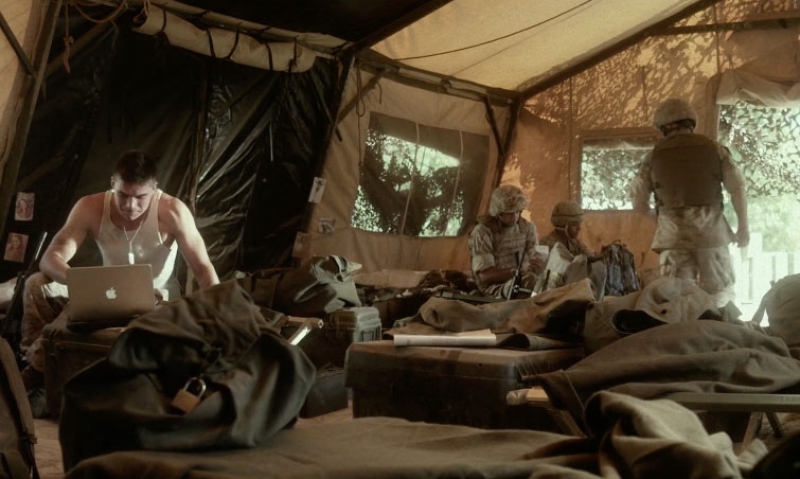
Legion Baseball, Boys State alumni capture effects of PTSD on film
War and the effects it has on troops returning home is captured in the award-winning film “Battle Scars,” a drama and thriller produced by two American Legion program alumni. The film is a recipient of the GI Film Festival's Founder’s Choice Award and will be available July 14 for Legion posts to screen.
“Battle Scars” is about a young Marine who is suffering from both post-traumatic stress disorder and other wounds unseen after returning home from Afghanistan. He in turn crosses paths with a woman “who leads him into a violent world every bit as dangerous and isolating as the brutality that (he) so desperately left behind in Afghanistan.”
Danny Buday, writer and director of “Battle Scars” and a California Boys State alum, and producer Lane Carlson, who played American Legion Baseball for Post 491 in Bayport, Minn., spoke with The American Legion about the inspiration for the film and how their participation in Legion programs impacted their support for America’s military heroes.
The American Legion: Who or what inspired this film?
Buday: I’ve seen a few documentaries about the ongoing war in Afghanistan while on the film festival circuit with my feature “5 Star Day,” and I found myself most fascinated with the sections of the documentaries that focused on the soldiers trying to adjust once they came back home from their various tours of duty. Soon after, I read an article about a recent increase in certain types of IED blast wounds and the idea for “Battle Scars” was born.
The struggle and tenacity displayed by our injured soldiers was the main inspiration for this film. Our goal was to create a film that soldiers suffering from PTSD would find both entertaining and relatable. This film is dedicated to every servicemember suffering from post-traumatic stress.
Why is this film so important to you?
Buday: On average, 22 servicemembers a day die from suicide. That number shook all of our team members and was one of the initial catalysts that led us to decide to focus on a story about post-traumatic stress and, more specifically, how both a soldier and their family deal with the physical and psychological effects of trying to acclimate back home after a long tour of duty overseas. For me, I felt it was important to try and share a story that other soldiers might be able to relate to and find common ground with.
Carlson: For me, this film is an opportunity to really bring home some hard facts of what continues to happen to our soldiers each day. The war continues on for many soldiers returning home. This film hit home as I have friends that have served in both Afghanistan and Iraq. My intention is to not only entertain and raise awareness for post-traumatic stress, but also offer out alternative healing modalities and organizations to help those dealing with post-traumatic stress.
Can you share what your experience with Boys State and Legion Baseball was like?
Buday: Boys State was an amazing experience and served as my introduction into the world of local, state and national politics while also providing a hands-on approach to mock government. My time during Boys State taught me valuable life lessons about how to work as a team toward a common goal and the value of the electoral process.
Carlson: I have fond memories of our coaches and team gathering at the Bayport Legion recreational area following our baseball games, eating pizza and sharing stories. We were always greeted with smiles and words of encouragement from Post 491.
Did your participation in Legion youth programs impact your appreciation for veterans?
Buday: My exposure to Boys State as well as my involvement in the Civil Air Patrol definitely played a role in my support for veterans and my desire to create a film that would resonate with veterans.
Carlson: I’ve always had the utmost respect for those men and women who’ve given their lives to help protect and serve. My exposure to the American Legion Baseball program definitely played a role in my support for veterans. I feel this film allows me the opportunity to give back to The American Legion.
What do you want viewers to take away from watching the film?
Buday: After watching Battle Scars, I hope audiences take away a better awareness and sense of compassion for the silent, psychological traumas that affect our soldiers. People see the external injuries of soldiers and most of them instantly feel an overwhelming sense of compassion, yet thousands of soldiers are coming home with post-traumatic stress each year and we can’t seem to find a way to focus the spotlight and attention on the tremendous amount of internal and unseen pain and suffering these brave men and women are coming back home with. Hopefully audiences take away a new perspective and appreciation for a soldier's individual journey and struggle to maintain their sense of self after seeing such atrocities overseas.
Carlson: The film illuminates the physical and psychological injuries our soldiers face on a daily basis. Our main character has an injury that we want the public to talk about. It’s important for us to continue the conversation about post-traumatic stress and the alarming rate of suicides our soldiers are facing each day. It’s up to all of us to come together and help our brothers and sisters who have served this great country. We have the opportunity to transform, inspire and unite around those suffering from post-traumatic stress.
View a trailer of "Battle Scars" here. American Legion posts that wish to screen the film can contact Lane Carlson at lane@souline.org. The 94-minute film is not rated but does contain strong language and scenes of nudity.
